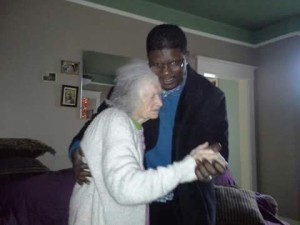Sandwich Generation Family Caregiver September 27, 2017
My name is Adriana and I am a Sandwich Generation Family Caregiver providing support for both my parents and children. I was pregnant with my first child when my mother became ill with five autoimmune diseases. At the time my parents were providing care for my grandmother who had dementia and lived with them. I quit my job and my family moved from Seattle to Olympia to help her. The decision was extremely difficult. My husband and I had amazing careers and owned our own home in Seattle. 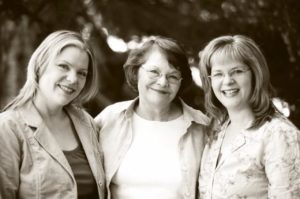 People thought we were crazy to “walk away” from the life we had built, but I felt there was no other choice. After my son was born I was diagnosed with cancer. We could no longer meet my grandma’s needs, so we sought out a home where she would get the care she needed. I toured every assisted living and skilled nursing facility in Thurston County with my 2-year-old son with special needs in tow. I found a wonderful adult family home and she lived there 6 years, until she passed away at the age of 92.
People thought we were crazy to “walk away” from the life we had built, but I felt there was no other choice. After my son was born I was diagnosed with cancer. We could no longer meet my grandma’s needs, so we sought out a home where she would get the care she needed. I toured every assisted living and skilled nursing facility in Thurston County with my 2-year-old son with special needs in tow. I found a wonderful adult family home and she lived there 6 years, until she passed away at the age of 92.
My passion for caring continued to grow as I adopted 2 children, both with special needs while providing in-home care for my parents. I provided in-home care for both my mother and father for 14 years until they passed away. While my Grandmother was living with my parents I did all aspects of personal care, including bathing, dressing, feeding, and toileting. The type of tasks I did for my parents were things such as making appointments, taking them on errands, driving them to medical appointments, cleaning and cooking. My father was able to live at home until the end of his life, with the help of paid caregivers. If I had not been available to care for them for all those years, it would have cost them on average $100,000 per year.
In total I was an unpaid family caregiver for my grandma and parents for a little over 14 years. There were times when I had to rely on my 11-year-old autistic son to care for my infant daughter for about 6 hours at a time so I could take my dad to treatments. I simply had no money for a sitter or respite care. My husband and I barely saw each other during this time. As soon as he got home from work, I had to go to the hospital or to my parent’s home to care for them. My health deteriorated because of the stress, I didn’t get very much sleep, and had no time for self-care.
While it was important for me to provide this care for my family, the financial impact can still be felt. To be a family caregiver I took 14 years off from work. I left a lucrative career as a marketing and business development professional. If I figure out my lost wages, a very conservative number would be $840,000. This has impacted my ability to save for retirement, save for my kid’s college, and pay for my own healthcare expenses associated with being a cancer survivor. When I think of my time as a family caregiver, I feel upset. I feel like I did not have any choices. Juggling the care of my elders and my children felt unbearable at times. I am still recovering physically and emotionally from the time I spent caring for my parents.
There are 850,000 family caregivers like me in Washington State. We need access to respite care so that we can provide for our families. If the Long-Term Care Trust Act had been available, it would have been a benefit that my parents and I would have been able to access of $100 per day for 365 days. This money could have been used for things like respite caregivers, supporting care at places like Adult Family Homes. This would improve the lives of so many.
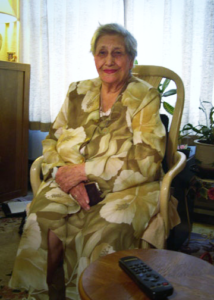

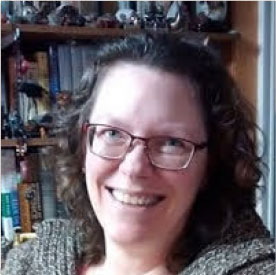

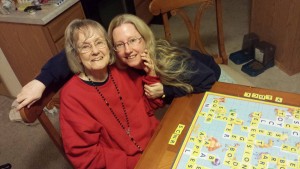 with difficult decisions Carrie Lange puts her parents’ wellbeing on the top of her list of priorities. Carrie had been asking her parents to move to Washington from Indiana so that she could support their care and wellbeing. She had always been denied based on her parents’ refusal to accept help. However, when her mom’s health took a turn for the worse after spending nineteen days in a nursing home they knew something had to change. Today, Carrie shares her home with her husband, two teens, five dogs, and her mom. In Washington her mom is able to go to a subsidized adult day program at Full Life in Renton. The City of Seattle also provides the bus service to pick her up and drop her off. This program is very important to the Lange family, Carrie says, “It’s a wonderful program that we would never be able to afford without the help. She goes 5 days a week for 4-5 hours a day. I honestly don’t know what I would do without that program!” It also means a lot to Carrie’s mom because her favorite thing to do is get on the bus to the adult day care center. “She can look out the huge windows, listen to the music. She really likes her bus trip.” It also provides a positive experience for her mom, “When she starts to get bored, we talk about how she’ll be catching the bus tomorrow to go to the senior center. Then she always calms down for a while and relaxes, because she has something to look forward to.”
with difficult decisions Carrie Lange puts her parents’ wellbeing on the top of her list of priorities. Carrie had been asking her parents to move to Washington from Indiana so that she could support their care and wellbeing. She had always been denied based on her parents’ refusal to accept help. However, when her mom’s health took a turn for the worse after spending nineteen days in a nursing home they knew something had to change. Today, Carrie shares her home with her husband, two teens, five dogs, and her mom. In Washington her mom is able to go to a subsidized adult day program at Full Life in Renton. The City of Seattle also provides the bus service to pick her up and drop her off. This program is very important to the Lange family, Carrie says, “It’s a wonderful program that we would never be able to afford without the help. She goes 5 days a week for 4-5 hours a day. I honestly don’t know what I would do without that program!” It also means a lot to Carrie’s mom because her favorite thing to do is get on the bus to the adult day care center. “She can look out the huge windows, listen to the music. She really likes her bus trip.” It also provides a positive experience for her mom, “When she starts to get bored, we talk about how she’ll be catching the bus tomorrow to go to the senior center. Then she always calms down for a while and relaxes, because she has something to look forward to.”
